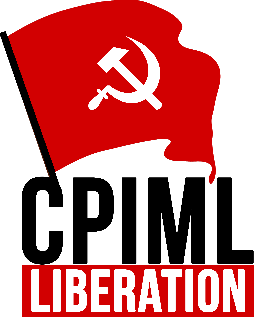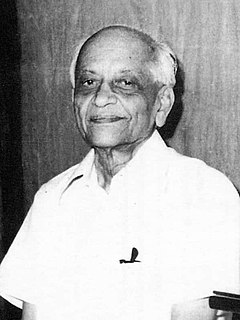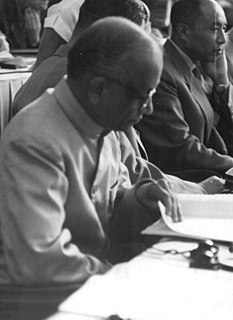
The Communist Party of India (CPI) is the oldest communist party in India and one of the eight national parties in the country. The CPI was founded in Kanpur on 26 December 1925.

The Communist Party of India (Marxist–Leninist) Liberation also referred to as the Liberation Group, is a Communist political party in India.

The Congress Socialist Party (CSP) was a socialist caucus within the Indian National Congress. It was founded in 1934 by Congress members who rejected what they saw as the anti-rational mysticism of Gandhi as well as the sectarian attitude of the Communist Party of India towards the Congress. Influenced by Fabianism as well as Marxism-Leninism, the CSP included advocates of armed struggle or sabotage (such as Yusuf Meherally, Jai Prakash Narayan, and Basawon Singh as well as those who insisted upon Ahimsa or Nonviolent resistance. The CSP advocated decentralized socialism in which co-operatives, trade unions, independent farmers, and local authorities would hold a substantial share of the economic power.

Muzaffar Ahmad was an Indian-Bengali politician, journalist and communist activist.

Puran Chand Joshi, one of the early leaders of the communist movement in India. He was the general secretary of the Communist Party of India from 1935 to 1947.

Malayapuram Singaravelu, also known as M. Singaravelu and Singaravelar, was a pioneer in more than one field in India. In 1918, he founded the first trade union in India. On 1 May 1923 he organised the first ever celebration of May Day in the country. Singaravelar was a major leader of the Indian independence movement, initially under the leadership of Gandhi, but later, joining the budding communist movement. In 1925, he became one of the founding fathers of the Communist Party of India; and chaired its inaugural convention in Kanpur. Though the British Government arrested him along with other leaders on charges of conspiring to wage war against the Crown, he was set free, soon after, on account of his failing health. Singaravelar was also a path-breaking social reformer who in his early life took to Buddhism, seeing it as a weapon against the evil of untouchability, which was particularly severe in the 19th-century India. He was also in the forefront of Self respect movement, in the Madras Presidency that fought for equal rights for backward castes. Though in his advanced years, he withdrew from active politics, Singaravelar remained a staunch advocate of the causes he had pioneered till his death at the age of 85.

Shripad Amrut Dange was an Indian Politician who was a founding member of the Communist Party of India (CPI) and a stalwart of Indian trade union movement. During the 20th century, Dange was arrested by the authorities for communist and trade union activities and was jailed for an overall period of 13 years.
Shaukat Usmani (1901–1978) was an early Indian communist, who was born to artistic USTA family of Bikaner and a member of the émigré Communist Party of India, established in Tashkent in 1920, and a founding member of the Communist Party of India (CPI) formed in Kanpur in 1925. He was also the only candidate to the British Parliament contesting elections, while he was residing in India—that too in a prison. He was sentenced to a total of 16 years in jail after being tried in the Kanpur (Cawnpore) Case of 1923 and later the Meerut Conspiracy Case of 1929.
Socialism in India is a political movement founded early in the 20th century, as a part of the broader movement to gain Indian independence from colonial rule. The movement grew quickly in popularity as it espoused the causes of India's farmers and labourers against the zamindars, princely class and landed gentry. Socialism shaped the principal economic and social policies of the Indian government but mostly followed Dirigisme after independence until the early 1990s, when India moved towards a more market-based economy. However, it remains a potent influence on Indian politics, with many national and regional political parties espousing democratic socialism.
Labour Kisan Party of Hindustan was a political party in India. The party was founded by Singaravelu Chettiar on 1 May 1923 in Madras. This was the first May Day celebration in India. This was also the first time the red flag was used in India.
The Workers and Peasants Party (WPP) was a political party in India, which worked inside the Indian National Congress in 1925–1929. It became an important front organisation for the Communist Party of India and an influential force in the Bombay labour movement. The party was able to muster some success in making alliances with other left elements inside the Congress Party, amongst them Jawaharlal Nehru. However, as the Communist International entered its 'Third Period' phase, the communists deserted the WPP project. The WPP was wound up, as its leadership was arrested by the British authorities in March 1929.

Philip Spratt was a British writer and intellectual. Initially a communist sent by the British arm of the Communist International (Comintern), based in Moscow, to spread Communism in India, he subsequently became a friend and colleague of M.N. Roy, founder of the Communist parties in Mexico and India, and along with him became a communist activist.
Communism in India (1925-1964) has existed as a social or political ideology as well as movement since at least as early as the 1920s. In its early years, the communist ideology was harshly suppressed through legal prohibitions and criminal prosecutions. Eventually, the communist parties became ensconced in national party politics, sprouting several political offshoots.

The Meerut Conspiracy Case was a controversial court case that was initiated in British Raj in March 1929 and decided in 1933. Several trade unionists, including three Englishmen, were arrested for organizing an Indian railway strike. The British government convicted 27 leftist trade union leaders under a lawsuit. The trial immediately caught attention in England, where it inspired the 1932 play Meerut by a Manchester street theatre group, the Red Megaphones, highlighting the detrimental effects of colonization and industrialisation.

Samar Mukherjee was an Indian Communist leader. who served as member of the Lok Sabha, the lower house of the Parliament of India for the Howrah constituency for three consecutive term, and as a member of the Rajya Sabha. He was a member of the Polit Bureau, member of the Central Committee of Communist Party of India (Marxist) and he was also the General Secretary CITU.
Sachchidanand Vishnu Ghate, also known as S.V. Ghate, was a freedom fighter and first General Secretary of the Communist Party of India. The Communist Party of India Karnataka State headquarters, Ghate Bhavan, is named in his honor.

In 1964 a major split occurred in the Communist Party of India. The split was the culmination of decades of tensions and factional infighting. When India became independent in 1947, differences arose of how to adapt to the new situation. As relations between the Nehru government and the Soviet Union improved, a faction that sought cooperation with the dominant Indian National Congress emerged within CPI. This tendency was led by S.A. Dange, whose role in the party hierarchy became increasingly controversial. When the Sino-Indian War broke out in 1962 Dange's opponents within CPI were jailed, but when they were released they sought to challenge his leadership. In 1964 the party was finally divided into two, with the left faction forming the Communist Party of India (Marxist). The split had a lot of regional variations. It also impacted other organizations, such as trade union and peasant movements. The split has been studied extensively by scholars, who have sought to analyze the various domestic and international factors involved.

Shantaram Savlaram Mirajkar was an Indian communist politician and trade unionist. He was part of the old guard of the Communist Party of India, led the All India Trade Union Congress as its president for many years and served as mayor of Bombay.
The Kanpur Bolshevik conspiracy case was a controversial court case initiated in British India in 1924.
Satyabhakta who used the mononym, was one of the founders of the Communist Party of India December 25-28, 1925 at Kanpur.











